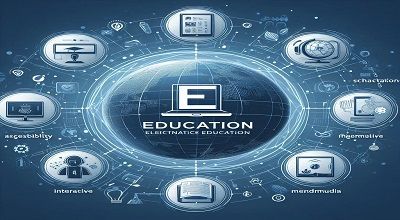E-Education
Electronic education, also known as e-education or online education. Refers to the use of digital technology and the Internet to deliver educational content and facilitate learning. It is an innovative approach to teaching and learning that leverages various electronic tools and resources to make education more accessible, flexible, and engaging. Electronic education encompasses a wide range of educational activities and formats, including:
- Online Courses: These are courses offered entirely or partially over the Internet. They can cover a broad spectrum of subjects and levels, from K-12 to higher education and professional development.
- Virtual Classrooms: Virtual classrooms replicate the experience of a traditional classroom environment in an online setting. They often include features such as live video lectures, real-time discussions, and interactive whiteboards.
- E-Learning Platforms: These platforms host a variety of educational materials, including videos, quizzes, assignments, and discussion forums. Learners can access these resources at their own pace and convenience.
- Massive Open Online Courses (MOOCs): MOOCs are a type of online course that is open to a large number of participants. They are typically offered by universities and other educational institutions. And often provide free or low-cost access to high-quality education.
- Webinars and Webcasts: These are online seminars or presentations conducted via live video streaming. They are often used for professional development and training purposes.
More Here,,,
- Mobile Learning: Educational content and resources are accessible on mobile devices, allowing learners to study on smartphones and tablets. Mobile apps, for example, are popular tools for delivering educational content.
- Blended Learning: This approach combines traditional in-person instruction with online components. It offers flexibility for learners and can enhance the learning experience.
- Educational Software: Various software applications and tools are designed for educational purposes. From interactive simulations to language learning apps.
- Learning Management Systems (LMS): These platforms help institutions and organizations manage and deliver their electronic education programs. They often include features for course creation, assessment, and student tracking.
- Open Educational Resources (OER): OER is freely available educational materials, including textbooks, videos, and other resources. That can be accessed online. They are often used to reduce the cost of education.
Electronic education offers several advantages, including accessibility for learners of all ages and backgrounds, flexibility in scheduling and pace of learning, and the ability to reach a global audience. It has gained significant prominence, especially in recent years. With the growth of online learning platforms and the increasing integration of technology in education at all levels.
Benefits Of E-Education
Electronic education, or e-education, offers numerous benefits for both learners and educational institutions. Here are some of the key advantages of e-education:
- Accessibility: E-education makes education accessible to a wider audience, including individuals who may have geographical, physical, or time constraints that limit their ability to attend traditional classes. Learners can access educational materials and resources from anywhere with an internet connection.
- Flexibility: Online courses and resources are typically available 24/7, allowing learners to study at their own pace and according to their schedules. This flexibility is especially valuable for working professionals, parents, or individuals with busy lifestyles.
- Cost-Effective: E-education often reduces the costs associated with traditional education. Such as commuting, housing, and printed textbooks. Many online courses and resources are also more affordable. Or even free, making education more cost-effective.
- Customization: E-education platforms often offer personalized learning experiences. Learners can choose the courses and materials that align with their interests and career goals, and they can progress at their own speed.
- Diverse Learning Resources: E-education provides access to a wide range of multimedia resources, including videos, interactive simulations, digital textbooks, and online forums. This diverse set of resources can enhance the learning experience and cater to different learning styles.
- Global Learning Opportunities: E-education allows learners to connect with instructors and peers from around the world. This global perspective can enrich the educational experience by exposing learners to diverse viewpoints and cultures.
Extra Benefits,,,
- Immediate Feedback: Online assessments and quizzes often provide instant feedback. Allowing learners to identify areas of improvement and adjust their study strategies accordingly.
- Enhanced Engagement: Many e-education platforms use multimedia, gamification, and interactive elements to make learning more engaging and enjoyable. This can help maintain learner interest and motivation.
- Career Advancement: E-education provides opportunities for skills development and career advancement. Learners can access courses and certifications that are directly relevant to their career goals, making them more competitive in the job market.
- Reduced Environmental Impact: By reducing the need for physical classrooms and printed materials, e-education can have a positive environmental impact by lowering carbon emissions and reducing paper waste.
- Self-Directed Learning: E-education promotes self-directed learning and digital literacy skills. Learners become more independent and resourceful in seeking information and solving problems.
- Inclusivity: E-education can be more inclusive for learners with disabilities. Digital accessibility features, such as screen readers and closed captions. Can accommodate a wider range of learning needs.
- Scalability: Educational institutions can reach a larger audience and scale their programs more easily through e-education, potentially reducing the strain on physical infrastructure.
E-education offers many benefits. It also comes with challenges, such as the need for effective online teaching strategies, and concerns about digital equity. The importance of maintaining social interaction and collaboration in virtual learning environments. Nonetheless, when implemented thoughtfully, e-education can provide a valuable. And flexible learning experience for individuals of all backgrounds and ages.
